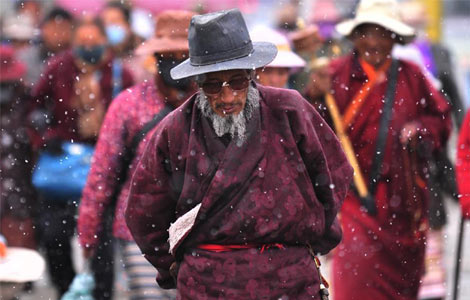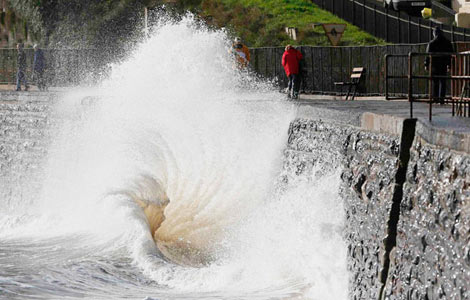The road once taken
Updated: 2013-10-29 08:12
By Cui Jia (China Daily)
|
||||||||
The 'ancestral' stone
In a letter to Emperor Qianlong praising the Xibe, Mingrui wrote: "The Xibe people based in Shengjing (now Shenyang, the capital of the northeastern province of Liaoning) are experts in archery and horsemanship. I believe their skills could be put to good use defending the border." The Emperor was impressed and granted the request.
 |
|
The travellers at their camp alongside the Kherlen River in Mongolia. Photos by Cui Meng / China Daily |
After lunch, Xue quietly asked her father to sit in his chair under a grape trellis in the middle of the courtyard. She then pulled something wrapped in a red cloth from her pocket before suddenly kneeling and carefully unveiling the contents.
She held out the offering in both hands: It was a dark red pebble she had picked up on the banks of the Kherlen River in Mongolia, the first watercourse encountered by the soldier-travelers' massive caravan, which is estimated to have been 12 kilometers long at some points in the journey. They used the river as a guide as they traveled across Mongolia, which was part of China at the time.
When Xue explained to her father that their ancestors might have even stepped on the pebble or dampened it with their sweat or tears 249 years ago, the elderly patriarch began to cry as he held it in his shaking hands. "It is now the most precious thing in our house," he said, gently rubbing the smooth surface of the stone.
In Qapqal, almost everyone dreams of retracing the steps of their famous ancestors, who bade farewell to their relatives and traveled more than 5,000 km across Mongolia to Xinjiang, a place about which they were entirely ignorant. "The Xibe people sacrificed their homes and lives for the good of the nation. We are born soldiers, so when the country needed us there was no room for hesitation," said Lao (old) Fu.
 ABC apologizes for 'Kimmel' joke
ABC apologizes for 'Kimmel' joke
 Snowfall hits many areas of Tibet
Snowfall hits many areas of Tibet  Lang Lang named UN Messenger of Peace
Lang Lang named UN Messenger of Peace Antiquated ideas source of Abe strategy
Antiquated ideas source of Abe strategy
 Storm wrecks havoc in S Britain, leaving 4 dead
Storm wrecks havoc in S Britain, leaving 4 dead
 Women's congress aims to close income gap, lift status
Women's congress aims to close income gap, lift status
 Sao Paulo Fashion Week held in Brazil
Sao Paulo Fashion Week held in Brazil
 Serena beats Li Na for WTA title
Serena beats Li Na for WTA title
Most Viewed
Editor's Picks

|

|

|

|

|

|
Today's Top News
Albright counsels fact not myth in US-China relations
Is Obama's lack of transparency really his fault?
San Diego Symphony debuts at Carnegie
Lang Lang takes on UN `Messenger of Peace’ role
At 72, China’s ‘Liberace’ still wows fans
Penn State: 26 people get $59.7m over Sandusky
China providing space training
Miscommunication causes conflicts
US Weekly

|

|







